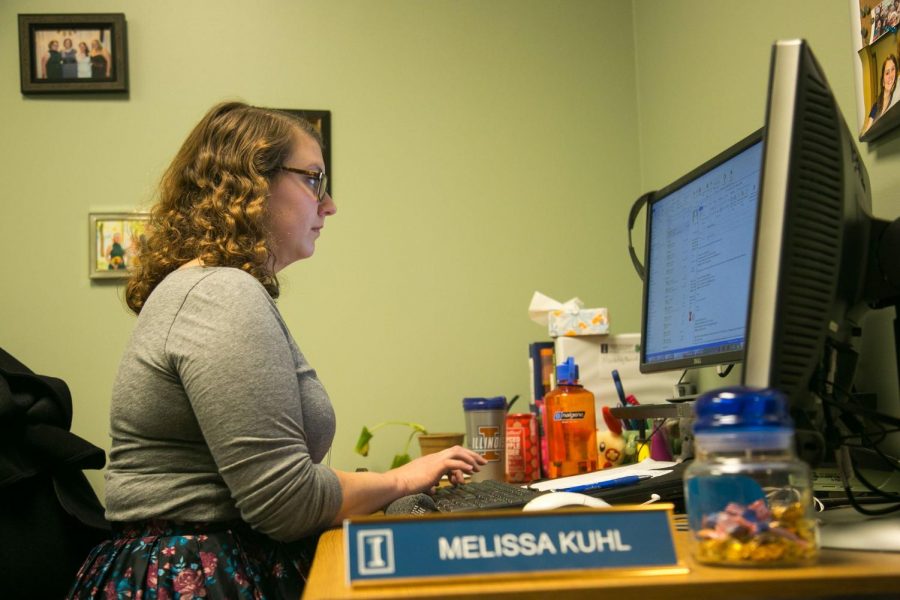Extension offices responsible for far more than outreach
Melissa Kuhl, publicity specialist, working at the Illinois Extension office on Nov. 10, 2017.
Nov 13, 2017
Last updated on Nov. 14, 2017 at 01:48 p.m.
The University’s Extension branch, originally created for community outreach in Illinois, has taken a far more important role in the state’s affairs since its inception.
“The whole idea is to take research generated here on campus and make it available to all the citizens of the state,” George Czapar, associate dean and director of University Extension and Outreach, said.
The four main programs associated with Extension are Agriculture and Natural Resources, Family and Consumer Sciences, 4-H Youth Development and Community and Economic Development. Extension is also responsible for administering SNAP-Education, a nutrition education program for the successor of the Illinois food stamp program.
Over 700 University employees work in Extension offices across the state. All but one of 102 counties in Illinois have an Extension office.
Get The Daily Illini in your inbox!
Czapar said in recent years, Extension has grown and evolved due to changing demographics.
“When Extension started, about 40 percent of the population lived on farms, and now about 1 percent lives on farms, and so Extension has changed and is going to where the people are,” Czapar said.
Water quality in Illinois has been one of Extension’s major projects in recent years. The University has been working with the Environmental Protection Agency in order to minimize nutrient loss to Illinois rivers and streams.
“Extension is still, at its core, based on research,” Czapar said. “What’s changed is what we’re involved with. It’s not just corn production, it’s other things too.”
Richard Gates, professor in ACES, is also employed by Extension. Gates must spend 35 percent of his time working on Extension appointments. He primarily works with the livestock industry.
Gates certifies livestock operators. Every three years, livestock farmers with more than 300 animals are required by law to take Gates’ class and training, in order to learn about environmental stewardship. Farmers with more than 1,000 animals must take a test administered by the USDA.
Gates also said he’s slowly transitioning his courses into an online workshop, but some more conservative residents prefer to take his class in person.
“The system’s ability send information out into the state is quite sophisticated,” he said,
Extension also has its own media group for timely issues regarding agriculture. Immediate change needs to be addressed and information needs to be sent to producers.
“We’ve had a new disease show up on corn each year in the last three years,” Suzanne Bissonnette said. “Not just new, new to the state, one of them was new to the country.”
Suzanne Bissonnette, assistant dean for Agriculture and Natural Resources for Extension, said that University Extension takes on the burden of preventing these diseases from causing damage by finding solutions and distributing them to taxpayers.
The Agriculture and Natural Resources program within Extension uses research from primarily research faculty as well as faculty with Extension appointments at the College of ACES.
“Faculty with Extension appointments tend to work on more applicable research,” Bissonnette said.
She said regional and unit educators in Illinois also do applied research, using farms as ‘labs’ and doing field research that is directly applicable for producers and other taxpayers.
Extension educators are also responsible for packaging existing research from on-campus faculty and packaging it in a usable way.
“A big part of our job is translation … just because we have research doesn’t mean that a producer knows how to apply that information,” Bissonnette said. “We have educators that do that too.”
Correction: A previous version of this article misstated which program Extension administers. It is SNAP-Education, not all SNAP benefits. The Daily Illini regrets the error.






